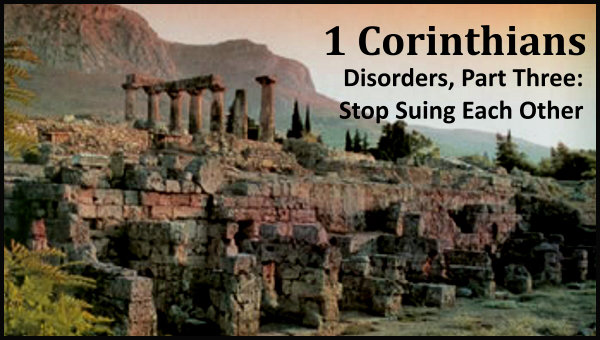By Tyson Thorne

Years ago host David Letterman on the Late Show once took a swig out of his coffee mug and offhandedly remarked, “I don’t think there’s a man, woman or child alive that doesn’t enjoy a tasty beverage.” But what happens if, say, a church goer gets a piping hot cup of coffee in his Sunday school class and spills it all over himself? Does he sue the church? The Sunday school teacher? The one who made the coffee? Hopefully not, but it wouldn’t be out of character for a Corinthian. Or for one of us in today’s litigious society.
Continuing his discussion that began in 5.9 regarding judgment, Paul now flips his initial illustration. In chapter five he exhorted the Corinthians to judge each other in the church, but not to judge an unbeliever. In chapter six he emphasizes the opposite truth: do not allow unbelievers to judge disputes among believers. Paul cites several reasons for this:
• Unbelievers are ungodly (.1)
• We are capable of judging our own disputes (.2-.4). Two illustrations are used for our competency to judge our own matters. The first is that we will judge angels. This little known and often unaddressed doctrine is clarified in 2 Peter 2.4 and Jude six as our having a part in the judgment of fallen angels. The second illustration is our role in judging the wicked. This difficult doctrine is expanded in Revelation 20.13 and tells of our role of judging and condemning the wicked based on their works.
• It is a poor testimony to unbelievers (2.5-.6) as such action implies that the church is lacking and must lean upon the world for intelligence, wisdom, and maturity and that, therefore, our God is not powerful enough to give us these things.
If these reasons are not enough to keep the body from settling matters in the secular court, Paul makes an even stronger appeal: To take one to court means you have already been defeated by the world. To use the language of chapter five, the yeast of unrighteousness has already worked through completely. What reason could Paul have for making such a strong statement? Because law suites are not consistent with a Christian ethic. This is clear from the questions he asks in verse seven:
• Why not rather be wronged?
• Why not rather be cheated?
Such questions bring to mind Jesus’ command to turn the other cheek. While Paul often defended himself in the secular court, he never initiated legal proceedings against either the Jews, the Romans or other Christians. Though a gang of 40 men had vowed to not eat until they had murdered Paul; though he had been stoned and left for dead; though he had been slandered, falsely accused and wrongfully imprisoned time and again, he never initiated a law suite. Instead, he endured the wrongs, and counted them all joy. On this passage, Craig Blomberg notes how difficult this passage is on the ears of Americans:
On a broader level, the whole concept of relinquishing one’s rights seems anathema to a culture immersed in asserting them. Women’s rights, civil rights, gay rights, liberation theology, even the so called “inalienable rights” of the American Constitution, all contain important Christian components but also owe their existence to significant secular and even anti-Christian influences.[1]
Rather than taking one another to court, we are to settle matters between ourselves, and with the assistance of the church if necessary. Remember his advice in chapter five? “Expel the wicked from among you!” Such action is appropriate since the wicked will not inherit the kingdom of God (6.9). Just who are the wicked? Since the list in 5.9-.11 wasn’t unabridged, he lists a few more here in 6.9-.10:
• Sexually immoral
• Idolaters
• Adulterers
• Male Prostitutes
• Homosexuals
• Thieves
• The greedy
• Drunkards
• Slanderers
• Swindlers
Though before coming to Christ many were some of these things — and worse! — we are now in Christ Jesus, and such behavior is unworthy of us.
How many of the sins listed above are sexual sins? At least four, though since most false religions employed sexual acts of worship it could be argued that idolaters were also sexually immoral. So at least four, perhaps as much as half the list, pertains to sexual sins. It is quite evident that the Corinthians had problems controlling their lusts. Perhaps this is what brought Paul back around to his initial topic of sexual immorality in verses 12 through 20.
________________________________________________________________________[1]The NIV Application Commentary: 1 Corinthians, Craig Blomberg, Zondervan, 1994
|
|